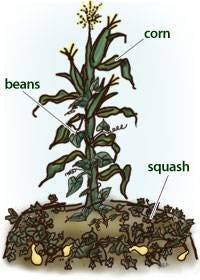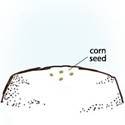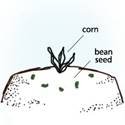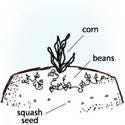


















Checkout using your account
Checkout as a new customer
Creating an account has many benefits:
Explore the dynamic relationship between corn, beans, and squash in the Three Sisters cropping system. Corn provides a sturdy structure for beans to climb, while beans fix nitrogen in the soil to nourish all three crops. Squash acts as a living mulch, suppressing weeds and retaining moisture.





















The ancient Native American technique of growing corn, beans, and squash together in an arrangement called the Three Sisters is the ultimate in companion planting and helps increase harvests, naturally.
Corn acts as a support for climbing bean vines, the beans fix nitrogen in the soil for the high feeding requirements of corn and squash, and the squash provides mulch and root protection for the corn and beans. After cooperating beautifully in the garden, corn and beans form a complete protein when eaten together. How's that for a mutually beneficial relationship?
The Three Sisters are all easy to direct sow in the garden and are a great project for children, teaching them about the beauty of natural harmony while providing a fast-growing reward for their efforts.
Make the best possible use of your garden space this season, and try growing the Three Sisters. Just follow the easy steps listed below, fertilize well, plant other companions like herbs to assist with pest control, and you'll be harvesting your best crop in no time.
In May or June when soil has warmed:
Shape a flat-topped circular mound of soil about a foot high and 2 feet across at the top, sloping outward toward the base. Plant a circle of corn seeds on top, about 5 or 6, and water them in well, tamping down your soil mound firmly so it doesn't wash away in the first rain. Space the mounds 3 or 4 feet apart in the garden.<p>Since all corn grows on sturdy, dependable stalks, the variety you choose depends on the flavor, disease resistance, and holding ability you want.
About two weeks later:
When your corn reaches about 5 or 6 inches high, plant bean seeds (6 to 8 of them) around the edges of the flat top or about halfway down the sloping sides of the circular mound. Push the seeds down deep into the soil and, if you're planting on the slope, make sure the soil is nice and firm. Add a bit of Nature's Aid at planting time to help the beans fix nitrogen.
To get your beans to climb up the cornstalks, choose pole rather than bush varieties.
One week or so after that:
Plant squash seeds around the base of the mound, on flat ground. You can make them radiate around the mound or just go in the direction you have available space. 6 to 8 seeds in a ring around the base of the mound is usually plenty.
The traditional squash family member for this Sister is pumpkin, with its all-American flavor and long growing season. For a quicker harvest, grow summer squash or zucchini.
When everything begins growing...
Thin the plantings to 2 or 3 corn stalks, each with no more than 2 bean plants winding around it. (You'll need to help the beans get started growing up the stalks.) The squash is going to vine along the ground, so the number of plants you need depends on how far apart your mounds of corn and beans are, how long the vines get, and how much walking space you need in the garden.
Add a FOURTH sister: Sunflowers
Sunflowers attract birds, thus tempting them away from your corn plants. They shade the vining bean plants while also adding support. Plus, they're beautiful. It's a win-win situation.





